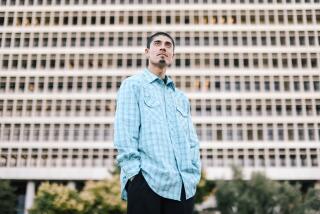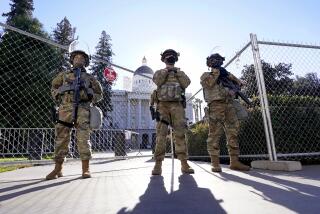Suspect in Tent Attack Was Unfit for War, Soldiers Testify
- Share via
FT. KNOX, Ky. -- Three army soldiers testified Wednesday that Sgt. Asan Akbar, accused of ambushing his fellow troops in Kuwait, never should have been sent to war because he was not fit for combat duty and often acted as a confused loner rather than a team leader.
But the soldiers said they were overruled by superiors who insisted that Akbar not be given special treatment and shielded from the hazards of war because “we need the numbers” and that the full force should be sent into harm’s way in Iraq.
On March 23, Akbar, a Muslim from Los Angeles and member of the 101st Airborne Division, allegedly lobbed grenades into three headquarters tents in Kuwait and fired his rifle at fleeing senior officers. Two officers were killed; 14 others were wounded.
This week, army officials are holding a preliminary military court hearing at Ft. Knox to determine whether Akbar, 32, should face a general court-martial trial this year.
Wednesday’s testimony was taken via teleconference from soldiers serving in Iraq.
Army prosecutors contend that Akbar meticulously planned the attack, sneaking grenades out of a Humvee truck, tossing them into the tents, and then lying in wait with his M-4 rifle as panicked officers rushed out of the burning tents.
But Akbar’s military defense lawyers suggest that Akbar has long suffered from emotional problems and was a poor fit for the military. They argue that because of his religious beliefs and his strange behavior, he should never have been sent to fight a war in a heavily Muslim region such as the Middle East.
On Wednesday, 1st Lt. John W. Evangalista testified that in the days before the ambush, Akbar was acting stranger than usual and was “possibly depressed or suicidal.” But he said he did not refer him for counseling or to a chaplain.
Three fellow sergeants testified that they had encouraged the senior leadership not to send Akbar from Ft. Campbell, Ky., to the Middle East for the war against Iraq.
Sgt. 1st Class Daniel Kumm said Akbar was unable to lead soldiers. “I did not want him to deploy,” Kumm said. “And if there was a job for him back in Ft. Campbell, that is where I would prefer him to be.”
Kumm said his senior officers rejected the suggestion. “I was told, ‘You will take him. We need the numbers, and we need to take full strength into Kuwait and Iraq,’ ” Kumm said.
Other supervisors saw no problem in having Akbar serve in combat.
“Sgt. Akbar was one of those guys who needed a lot of coaching, teaching and mentoring,” said 1st Sgt. Daniel Bates. “That’s OK. We promote based on potential.”
Bates said he determined that Akbar was “fully capable” of fighting. “I felt he could fulfill his duties,” he said. “We had him with one of the strongest squad leaders in the unit, and I thought he could perhaps be successful.”
Nevertheless, a steady stream of witnesses Tuesday and Wednesday testified that Akbar was stressed. They said he often walked aimlessly, talked to himself and laughed for no apparent reason.
He also had trouble sleeping and often walked in his sleep. Other times, he fell asleep in training rooms or inside military vehicles.
Sgt. Billy George Rogers said Akbar once called him at Ft. Campbell and asked if it was true, as he apparently had heard other soldiers say, that the U.S. was going to “rape and plunder” Muslims. Rogers said he had to calm Akbar and assure him that U.S. troops had no such desires.
On the night of the ambush in Kuwait, as the 101st Airborne awaited orders to enter Iraq, Akbar had been on guard duty next to a cache of grenades. After the attack, seven of them were missing, according to testimony Wednesday.
It was the first explanation of where the assailant might have obtained the grenades, although there was no testimony that Akbar was seen taking them.
“He must have taken them,” Sgt. David Walter testified.
More to Read
Sign up for Essential California
The most important California stories and recommendations in your inbox every morning.
You may occasionally receive promotional content from the Los Angeles Times.














